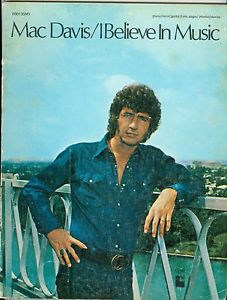| "I Believe in Music" | ||||
|---|---|---|---|---|
 | ||||
| Single by Mac Davis | ||||
| from the album I Believe in Music | ||||
| B-side | "Hollywood Humpty Dumpty" | |||
| Released | October 1970 [1] [2] August 31, 1971 [3] (re-release) | |||
| Recorded | 1970 | |||
| Genre | Pop | |||
| Length | 3:13 | |||
| Label | Columbia | |||
| Songwriter | Mac Davis | |||
| Producers | The Tokens, Dave Appell | |||
| Mac Davis singles chronology | ||||
| ||||
| "I Believe in Music" | ||||
|---|---|---|---|---|
 | ||||
| Single by Gallery | ||||
| from the album Nice to Be with You | ||||
| B-side | "Someone" | |||
| Released | August 1972 | |||
| Recorded | 1971 | |||
| Genre | Soft rock | |||
| Length | 2:26 | |||
| Label | Sussex Records | |||
| Songwriter | Mac Davis | |||
| Gallery singles chronology | ||||
| ||||
"I Believe in Music" is a 1970 song written and recorded by Mac Davis and later included on his second album I Believe in Music . [4] Gallery covered it in 1972 as the second of three singles off their Nice to Be with You album [5] and the follow-up release to their title track.
Contents
Gallery's version reached #22 on the US Billboard Hot 100 and #13 on the US Cash Box Top 100. It hit #5 in Canada. [6]
Mac Davis's original had been released as a single nearly two years earlier and made a minor dent in the pop charts (US #117). His effort achieved #25 on the Adult Contemporary chart. [7] It later became his signature song and an iconic anthem of the early '70s. [8]
